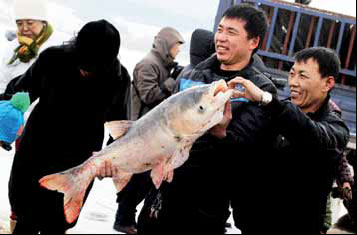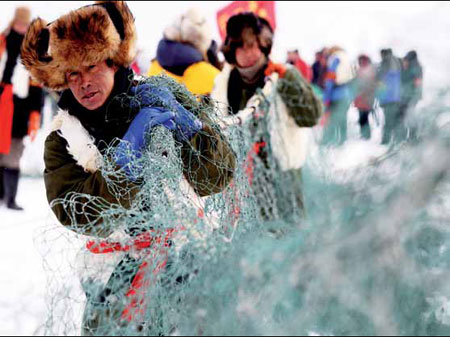IN BRIEF (Page 3)
Updated: 2014-01-03 09:55
(China Daily Europe)
|
|||||||||||
Society
People have open mind on euthanasia
A recent survey shows that more than two-thirds of Chinese have an open and tolerant attitude toward euthanasia, which has long been debated and banned in the country.
According to the survey, conducted by the public opinion research center at Shanghai Jiao Tong University, about 70 percent of the more than 3,400 polled residents from 34 cities said they do not object to euthanasia or accept the idea.
The survey, released last week, was conducted through a computer-assisted telephone interview.
"Euthanasia has been widely discussed around the world," said Zhong Yang, the research center's director. "In China, people's attitudes toward death have changed with the times, and more people hope to die painlessly."
The topic of death has long been taboo in China.
In recent years, a series of cases about assisted suicide, allegedly to ease suffering, has given rise to a nationwide debate on euthanasia, which is banned under current Chinese law.
Arctic Circle
Official proposes bigger role in region
China can play a bigger role in the increasingly ice-free Arctic Circle, using its investment advantages and the size of its markets and labor force, but it is "far from becoming a power player in the Arctic", said the head of the polar strategic research division under the Polar Research Institute of China.
"As a latecomer, China has a lot of homework to do to learn more about the rapidly changing region and then to better serve the country's development," Zhang Xia, also deputy chief of the new China-Nordic Arctic Research Center, said.
Zhang's comments came amid increased jostling by the major Arctic powers for control in the region, which is believed to hold rich mineral and energy resources as well as emerging shipping opportunities.
The five nations with territory near the Arctic circle, Canada, Norway, Russia, the United States and Denmark (through Greenland) are currently allotted an exclusive economic zone of 200 nautical miles from their northern coasts.
Legal
NPO rules expected this year
The long-awaited rules for foreign nonprofit organizations that want to register on the Chinese mainland are expected to be released this year, a senior official from the Ministry of Civil Affairs said.
A dual administrative system will be enforced for foreign NPOs, although China has simplified the registration process for a limited number of domestic social organizations.
"The government will carry out registration work for the representative offices of overseas non-governmental organizations and provide guidance to them on how to operate legally," said Li Liguo, minister of civil affairs.
Yu Yonglong, who is in charge of foreign-NPO administration at the ministry, said that the State Council is reviewing three amended regulations on NPOs.
Economy
GDP to grow steadily this year
The economy and the financial market will grow steadily this year, Premier Li Keqiang has said.
By pushing ahead with market reforms, China will be able to maintain the smooth running of its economy and the general stability of the financial market, Li said.
To achieve the target, the premier has promised a prudent fiscal policy. He said the government will maintain liquidity at a proper level, sustain the reasonable growth of monetary credit and social financing, as well as keep prices stable.
A major think tank, the National Academy of Economic Strategy, previously predicted the best scenario for China's GDP growth this year would be 7.8 percent, a slight rise from the 7.6 percent expected to be confirmed for last year.
During his inspection tour in Tianjin on Dec 27, Li also highlighted the supporting role of the finance industry in the development of the real economy, according to a news release on Dec 29.
The real economy refers to the part of the economy concerned with producing goods and services, as opposed to buying and selling on the financial markets.
Space
Navigation system to be made free
The world can expect to use China's "reliable" global positioning and navigation services for free by 2020, the director of the country's satellite navigation office said on Dec 27.
"The Beidou Navigation Satellite System is committed to providing services to the whole world - as it now does for the Asia-Pacific - for free," said Ran Chengqi, director of the China Satellite Navigation Office.
The office released two documents to specify China's homegrown navigation system's open service performance standard and to facilitate research and development of various terminals for global users.
After deploying 16 satellites since 2000, the country will begin launching newer navigation satellites near the end of 2014, Ran said.
In six to eight years, the number of satellites that will be launched is expected to grow to 40 to form a constellation as coverage expands globally.
These satellites, which have enhanced functions, will have a lifespan of up to 15 years. The satellites currently in use work for about eight years.
Health
Country's hepatitis B vaccines are safe
"Given that the hepatitis B virus is still around, it's important for babies to get vaccinated," he said.
The WHO Beijing office met with the National Health and Family Planning Commission on Thursday to discuss the latest developments surrounding incidents in which 11 newborns have died after being inoculated against hepatitis B.
Schwartlander said it is difficult to establish a causal link between the vaccines and the babies' deaths since nearly all infants in China receive the vaccine as part of a very successful vaccination program.
Statistics from the commission showed that more than 16 million babies were born in China last year, and 90 percent of them were covered by the program that offers hepatitis B vaccinations free of charge.
China Daily-Xinhua
|
Fishermen caught 90,000 kg of fish on Dec 29, the first day of the annual fishing event at Shitoukoumen Reservoir in Changchun, Jilin province. The event follows an ancient hunting and fishing culture in Northeast China, dating back about 1,000 years. Zhu Xingxin / China Daily |

(China Daily European Weekly 01/03/2014 page3)
Today's Top News
Merkel fractures pelvis skiing, cancels visits
Portugal declares three-day mourning for Eusebio
Forbidden City to be closed every Monday
Icebreaker prepares for breakout
Beijing rejects Abe's call
Illegal ivory stash destroyed
Israeli ex-PM Sharon's condition in steady decline
Yahoo says ads in Europe spread malware
Hot Topics
Lunar probe , China growth forecasts, Emission rules get tougher, China seen through 'colored lens', International board,
Editor's Picks

|

|

|

|

|

|






